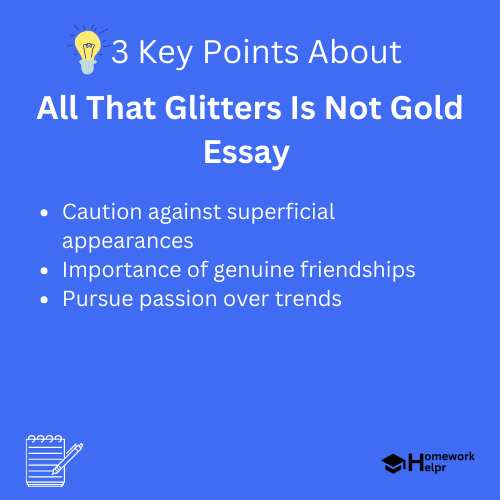📝 Summary
The phrase ‚ÄúAll that glitters is not gold” reminds us that appearances can be deceiving. Originating from William Shakespeare, it underscores the importance of discerning true value beneath shiny surfaces. In contemporary life, students and children face pressures related to friendships, education, and career choices. Nurturing genuine relationships, valuing true learning over grades, and pursuing passion-based careers are essential lessons from this proverb. Embracing critical thinking and discernment can lead to a more authentic and fulfilling life, revealing that true treasures often lie beneath the surface.}
All That Glitters Is Not Gold: An Essay for Students and Children
The phrase ‚ÄúAll that glitters is not gold” is a timeless adage that conveys a significant lesson in life. It teaches us that not everything that appears valuable or attractive at first glance is truly precious or worthwhile. With an increasing emphasis on outward appearances, this message is especially relevant for students and children today. In this essay, we will explore the origins, implications, and applications of this proverb in various aspects of life.
Origins of the Phrase
The origins of the phrase can be traced back to William Shakespeare, the renowned English playwright and poet. He used it in his play, The Merchant of Venice, in which the character Prince of Morocco states, ‚ÄúAll that glitters is not gold.” This line illustrates that despite the attractive surface of an object, its true quality may not be reflected in its appearance. This proverb has since become a key part of the English lexicon, emphasizing the importance of discernment.
Definition
Proverb: A short, well-known saying that expresses an obvious truth or gives advice.
The Deeper Meaning
At its core, the saying serves as a reminder to look beyond superficial qualities. In a world filled with facades and appearances, it is crucial to develop a critical mindset. Just like a shiny rock may seem valuable but is merely a piece of glass, many things in life can be deceiving. For instance, a person may appear confident and successful, but their inner struggles may not be visible to others.
Definition
Facade: An outward appearance that is maintained to conceal a less pleasant reality.
Examples
Consider someone who shows off expensive clothing but struggles financially. Their appearance might suggest wealth, but the reality is far different.
Applications in Daily Life
This adage has practical applications in various facets of life, including friendships, education, and career choices. Let’s delve into how this saying can guide students and children in their daily lives.
1. Friendships
Many children and students may find themselves attracted to friendships based on popularity or trends. However, it is important to nurture relationships with those who are genuine and supportive. Just because someone is popular doesn’t mean they are a true friend. A fulfilling friendship is built on trust and understanding, rather than mere appearances.
2. Education
In academia, students often feel pressured to achieve high grades or to attend prestigious schools. This can lead them to take shortcuts or engage in dishonest practices to attain those marks. It is vital to remember that true learning and understanding are far more valuable than the shiny grades on a report card. Focus on developing a love for learning, rather than just the grades.
❓Did You Know?
Did you know that the phrase “All that glitters is not gold” was originally spoken by a character who is not actually a goldsmith, showing that appearances can be misleading even in literature?
3. Career Choices
Many students dream of glamorous careers, often influenced by movies and social media. However, it is essential to pursue careers that match one‚’ passion and skills. A job that seems appealing on the outside may not be fulfilling. Reflection and self-assessment are essential before making career choices to ensure genuine satisfaction.
Definition
Self-assessment: An evaluation of one’s own strengths and weaknesses.
Examples
A student may aspire to be a doctor because of societal admiration, but they might find greater happiness in pursuing a career in art or music, where their true passion lies.

The Importance of Critical Thinking
The essence of the phrase ‚Äúall that glitters is not gold” encourages students to cultivate critical thinking. This involves evaluating information, questioning validity, and seeking deeper truths. For instance, when encountering social media posts that feature luxurious lifestyles, it is essential to assess whether these portrayals are true or curated.
Definition
Critical Thinking: The objective analysis and evaluation of an issue in order to form a judgment.
Becoming More Discernible
To navigate a world filled with distractions and illusions successfully, it is vital to become more discernible. This can be achieved through the following strategies:
- Practice Mindfulness: Taking time to reflect on experiences can foster a deeper understanding of what truly matters.
- Ask Questions: Never hesitate to inquire about the background or authenticity of what you see. Whether it‚’ friends, grades, or career paths, asking probing questions can reveal truths.
- Seek Genuine Connections: Build friendships with those who value honesty and authenticity, rather than superficial traits.
Conclusion
In conclusion, the phrase ‚ÄúAll that glitters is not gold” serves as a profound reminder to look beyond appearances and seek the genuine value in what surrounds us. As students and children grow and make choices about friendships, education, and careers, embracing the essence of this saying can lead to a more fulfilling and authentic life. Remember, the most valuable things often lie beneath the surface; with curiosity and discernment, you can discover the true treasures in life.
Related Questions on All That Glitters Is Not Gold Essay for Students and Children
What does the phrase mean?
Answer: It means appearances can be misleading.
Who coined the phrase?
Answer: The phrase originated from William Shakespeare.
How can this phrase apply to education?
Answer: Focus on true learning rather than just grades.
Why is critical thinking important?
Answer: It helps evaluate the authenticity of information.
